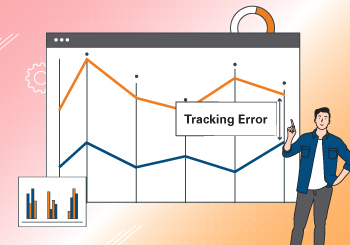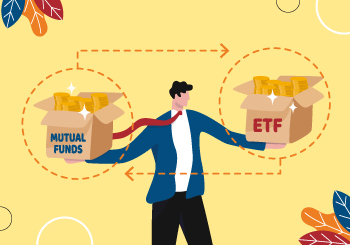ETFs are quite popular today, because they are innovative investment options that give people the flexibility and diversity to invest in a basket of securities that are part of an index or indices of a stock exchange. These ETFs mimic the performance of the underlying index, and investors can buy/sell them like shares. The trading value at which these ETFs are bought and sold depends on the market performance of the fund's underlying index.
Investors should understand that there are different types of ETFs available for investing in India.. The goals, funds invested and the potential returns of these ETFs will vary based on their type. So, in the following sections, we will see the different types of ETFs available at your disposal.
Common types of ETFs in India
The four most common types of ETFs available for investment in India are the following:
- Equity ETF
- Liquid ETF
- Commodity ETF
- ETF Fund of Funds
Equity ETF
Equity Exchange Traded Funds are passive investment instruments that combine the flexibility of investing in stocks and the simplicity of equity mutual funds. These funds trade on an exchange like any other company stock and can be bought and sold continuously at market prices on real-time basis. Due to its different structure and creation mechanism, these funds are cost effective in nature and offers complete transparency on the holdings of an ETF. There are multiple types of Equity ETFs depending on the underlying equity index the particular scheme is tracking. These funds can be suitable for investors who are seeking for better liquidity and diversification in their investment portfolio.
Equity ETFs can be further classified into factor-based, market based and sector/thematic based funds. Factor based ETF schemes tracks a factor based index which is created by active stock selection using conditions such as low volatility, momentum, alpha, quality, value, momentum, size etc. and not market capitalization. The number of factors may increase as more academic research is concentrated around them. Stocks in the index are weighted using these factors – for example, lower volatility stock has a higher weight. So this combines active stock-picking which is quantitative and is rule-based with passive investing. Smart Beta ETFs could be one example for factor based schemes.
Market cap based ETF schemes tracks indices that measure the performance of companies in different market caps –large/medium/small. For example, ETF schemes that follow Nifty 50 TRI would benefit from being exposed to companies that part of the major sectors of the economy or if it follows Nifty Midcap 150 TRI that measures the performance of next 150 companies after Nifty 100 from the Nifty 500 universe then the scheme would be exposed to performance of these mid cap companies.
Sector/thematic ETF schemes would track the underlying index that comprises of basket of securities from different sectors such as bank, FMCG. Thematic ETF schemes would track a stock market index that invests in various sectors that are woven around a certain theme.
Liquid ETF
Liquid Exchange Traded Funds (ETFs) are funds that invest in short term maturity instruments such as Tri-Party Repos (TREPS*), and other money market instruments. TREPS are highly liquid and fully collateralized. These types of ETFs aims to provide returns that closely correspond to returns of the underlying market index, subject to tracking error.
Investors who want to park their idle cash in a hassle-free manner between trades can invest in this type of ETFs. Since they are listed and traded on stock exchange, you can buy and sell your units anytime you want at real time prices during the trading day. These funds can be suitable for investors who are seeking for higher liquidity in their investment portfolio.
In liquid ETFs, investors get the exposure of fixed income instruments like government bonds and debentures of companies that are a part of an index. Since it may offer the stability of government securities, Liquid ETFs have attracted many retail investors in the recent past. A liquid ETF is designed to mirror the index entirely it invests in. Bonds and other debt instruments help give you stable returns, thereby reducing your exposure to market volatility.
*TREPS means a repo contract where a third entity (apart from the borrower and lender) call a Tri-Party Agent, acts as an intermediary between the two parties to the repo to facilitate services like collateral selection, payment and settlement, custody and management during the life of the transaction (Source: www.ccilindia.com)
Commodity ETF
Commodity ETF is a commodity based exchange traded fund that invests in assets such as gold, silver etc. They are passively managed funds that track the underlying market index. The net asset value (NAV) of these funds changes throughout the day. The fluctuation in price change depends on the supply and the demand in the markets. Here, the investor invests in stocks instead of the actual metal. Gold ETFs which are types of commodity ETFs, combines the features of stock trade and gold investment. Since the gold prices on the stock exchange are available to public, you can easily know the value of your investment portfolio thus adding on the advantage of transparency of investing in these funds. Because of its direct gold pricing, there is a complete transparency on the holdings of an ETF. Further due to its unique structure and creation mechanism, the ETFs have much lower expenses as compared to physical gold investments. When you are investing in commodity ETFs, there is no storage hassle, as you are dealing with a dematerialised form of that particular commodity. When you actually redeem from these ETFs, you don’t get physical form of the commodity, but receive the cash equivalent of the same. Trading of these ETFs takes place through a demat account and a broker, which makes it an extremely convenient way of electronically investing in gold/silver etc. These are ideal for investors who wish to invest in gold/silver but do not want to invest in physical form due to the storage hassles/doubt about purity and are also looking to get tax benefits.
ETF FoFs (ETF Fund of Funds)
Fund of Funds (FoFs) are mutual fund schemes that essentially invests in other mutual fund schemes. They don’t hold shares or bonds of companies but instead holds units of other mutual fund schemes. Therefore, ETF Fund of Funds schemes will invest in other exchange traded funds offered by various AMCs (Asset management companies). The investors get an opportunity to benefit from diversification as well as the option of investing in various fund categories by investing in FoFs.
There are various FoFs available in the market that may invest in equity ETFs, debt ETFs, Commodity ETFs. For investing in ETFs, an investor requires a demat account for buying or selling your units which some investors may not prefer. Whereas, when investors buys units of ETF FoFs, they are buying/selling units just like any other traditional mutual fund schemes and would not require a demat account.
Before investing in ETFs, please read through their terms to understand their asset allocation more and avoid unpleasant surprises later.
An investor education initiative.
Visit www.icicipruamc.com/note to know more about the process to complete a one-time Know Your Customer (KYC) requirement to invest in Mutual Funds. Investors should only deal with registered Mutual Funds, details of which can be verified on the SEBI website (www.sebi.gov.in/intermediaries.html). For any queries, complaints & grievance redressal, investors may reach out to the AMCs and / or Investor Relations Officers. Additionally, investors may also lodge complaints on https://scores.gov.in if they are unsatisfied with the resolutions given by AMCs. SCORES portal facilitates you to lodge your complaint online with SEBI and subsequently view its status.
Mutual Fund investments are subject to market risks, read all scheme related documents carefully.
![]()
![]()
![]()
![]()






















